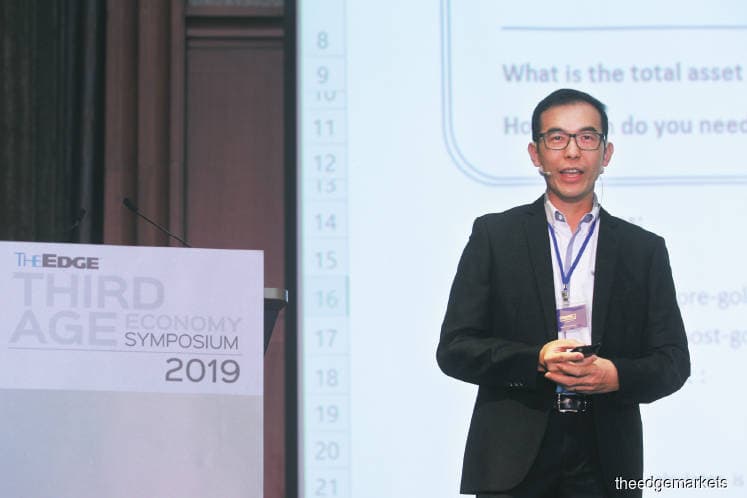
This article first appeared in Personal Wealth, The Edge Malaysia Weekly on July 8, 2019 - July 14, 2019
A persistent myth in the wealth management industry is that retirees cannot afford to have risk assets like equities in their investment portfolio. Because of this, says Areca Capital Sdn Bhd CEO Danny Wong, they then put their funds only in low-risk assets that end up giving them poor returns.
“They invariably put their funds into low-risk assets, which, predictably, yield them very low returns. Unfortunately, this does not protect your portfolio against creeping inflation over the years. Retirees need to take this into account before deciding how much money they would need over a particular time horizon,” he told participants at the recently concluded Third Age Economy Symposium.
In fact, he said, it is entirely possible for someone approaching retirement age to have a portion of his portfolio dedicated to equities. After all, with successive generations living longer than ever before, one’s portfolio needs to be just as long-lived.
Older investors, particularly those about to hit retirement age, cannot afford to ignore the detrimental effect that inflation can have on their portfolios. Wong called for leveraging risk assets in order to guard against inflation, adding that price increases in even innocuous products could have potentially significant ramifications on spending power.
“Official figures for May this year show that inflation stood at 0.2%. This figure is similar to that of April and March. However, back in December 2009, a 1kg pack of sugar cost just RM1.45. Today, it costs RM2.85 (nearly double the price over 10 years). This is just one of the ways in which your portfolio gets smaller over time, thus affecting your retirement prospects.”
But in order to use the capital markets to one’s advantage, he said that one needs a disciplined approach in order to optimise — not necessarily maximise — one’s asset allocation. “You need the optimal asset allocation, taking into account your risk tolerance, available assets and objectives. If you would like to be more aggressive, you could allocate more of your portfolio to equities. Alternatively, a more conservative strategy means your portfolio could have a defensive asset class bias.
“Ultimately, what everyone needs is a diversified portfolio. This should ideally consist of sufficient liquidity (cash), hard assets (such as real estate), a portion of fixed income, as well as equities to provide returns.”
A comfortable retirement
Of course, the purpose of keeping a portolio in good order is so that retirees can live comfortably off the fruit of their years of hard work, while also having enough to set aside for their families. To this end, Wong suggested retirees spread their spending across a number of “wallets”.
“The first wallet is for daily enjoyment, where expenses would typically be [spent on things] such as meals and miscelleanous transport costs. The second wallet would be dedicated to slightly bigger ticket expenses that help you maintain a healthy lifestyle and good relationships. These could include health supplements as well as the occasional wining and dining with friends.
“The third wallet would typically be reserved for vacations. You would want to be able to afford nice holidays every now and again. As for the fourth and final wallet, that could be reserved for one’s family. Asians love to leave some money to their next of kin or, alternatively, set aside some funds for future generations to look after the family business.”
Once these are in order, retirees will want to see to the proper management and administration of their affairs, for them and their families’ peace of mind. Although drafting a last will and testament is a common and effective way to manage one’s estate, Wong advised participants to consider the use of private trusts as another estate management mechanism. “A will is great for transferring your assets to your next of kin upon death, but what happens in the unfortunate event one falls very ill or is incapacitated later on in life? This is where the setting up of a private trust would be beneficial.”
Unlike a will, which only kicks in upon death, an individual is free to set up a private trust and have it up and running during his lifetime. He may stipulate various conditions for beneficiaries to satisfy before they are granted access to the assets in the trust. The person who sets up the private trust, typically referred to as the settlor, may also stipulate a monthly income or stipend for his beneficiaries, rather than bequeathing lump sum amounts or entire assets. This will ensure the trust’s long-term sustainability.
Save by subscribing to us for your print and/or digital copy.
P/S: The Edge is also available on Apple's AppStore and Androids' Google Play.